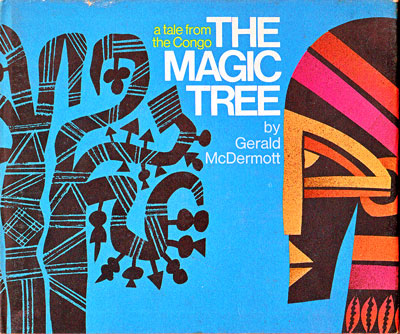11.May.2010 The Magic Tree by Gerald McDermott

Gerald McDermott’s The Magic Tree is a not a tale with a happy ending – indeed the final pages are deliciously ambiguous.
First told as an animated short film in 1970 and then published in book form in 1973, The Magic Tree is apparently adapted from a traditional Congolese folktale. It tells the story of two brothers, one favoured by their mother, Luemba, and the other ‘ugly’ and cast aside, Mavungu. Mavunga leaves his family home and travels down the river to where he finds a tree and frees a beautiful princess from its magic spell.
Mavungu is transformed and a village springs up around he and the princess. Eventually Mavungu’s family hears of his fortune and travels to visit him. Mavungu feels the pull of the family home but is reminded by the princess that he has promised never to speak of the magic tree and its spell. His family leaves but Mavungu decides later to pay his despicable mother another visit and he cannot hold his tongue – all is revealed. Mavungu flees only to find that everything is gone.
The story’s end – told entirely without words – is jarring in a way that opens up the narrative for discussion. What happens now to Mavungu? Why was his mother so wicked? Why is this so unfair? Although these are unpleasant questions, you can almost see them playing out in the little listeners minds.
Beautifully illustrated with an almost wood-cut feel and with great use of dark blues and orange tones, the story’s atmosphere carries well. Also, I think that this book must of have been my first mass exposure to Helvetica as a child. The contrast between the jerky lines of the illustrations and the straight functionalism of the type is lovely too.
I’d be keen to see the short animation the story was evolved from. McDermott has some of his other animations from the period freely available via the Academic Film Archive and the Internet Archive.